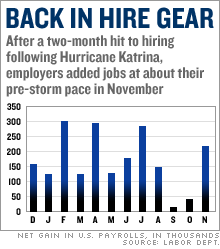Hoping for the worst on jobs?
Strong December payroll growth could spook stock market, bring more active Fed back into play.
NEW YORK (CNNMoney.com) - Many on Wall Street are probably hoping for the worst when the government's December job report is released Friday. Job growth was solid for most of 2005, with an average of just under 200,000 jobs created each month, excluding September and October, when job growth was hurt by Hurricane Katrina.
The forecast is for more solid growth in December, with economists surveyed by Briefing.com looking for a gain of 200,000 jobs, and the unemployment rate holding steady at 5 percent. But Wall Street economists say that this is one of those situations where good news is bad news, and vice versa, not only for the bond market, which often reacts negatively to news signaling strong economic growth, but also for stocks. A very strong number on job growth, say 300,000 or above, could cause stocks to sell off Friday since it would spark concerns that the Federal Reserve is not as close to ending its interest rate hikes as it signaled earlier this week when it released the minutes of its December meeting. While just about everyone expects the central bank to make its 14th straight quarter-percentage-point rate hike at its Jan. 30 meeting, many are now hoping that increase or one more will mark the end of its tightening policy. "I think if you get a payroll above 300, it will probably spook the market. It puts the Fed back into play," said Anthony Chan, senior economist with JPMorgan Asset Management, who is looking for a 195,000 job gain. Brian Jones, economist with Citigroup who has a more bullish forecast of a 300,000 job gain, isn't as sure stocks will be spooked by a big jump, although he says it's certainly a possibility. "All other things being equal, it (a big jump in employment) should be good for equity markets. But they'll have a tug a war on where the Fed is going beyond the January meeting," said Jones. Economists generally agree that a much weaker-than-expected jobs report will probably send both stocks and Treasury bonds soaring, as investors will take the news as another sign that the Jan. 30 meeting could mark the Fed's last rate hike -- at least for a while. Stocks rallied strongly Tuesday and rose further Wednesday on the Fed minutes due to just that expectation. "Right now that's not the flavor of the month," said Chan, noting investors were focusing on an end to Fed rate hikes rather than a possible slowdown in the economy. "I think they'll get excited about (a weak report), because everything else out there is very strong. The sentiment in the markets is not afraid about slower growth." Jones argues that even a 300,000 payroll gain probably doesn't show the economy overheating or mean the Fed will have to raise rates at the March meeting, the first one where incoming Fed Chairman Ben Bernanke would preside. He said a strong gain would represent further recovery from the effects of Katrina. And he notes that the Fed will get to see the January and February reports before it holds its second meeting of the year on March 28. Economic activity early this year is "more critical to the Fed at that (March) meeting than anything released Friday," he said. But of course that won't stop the markets from reacting to the widely awaited report, the first official glimpse at the economy's performance last month. For a look at some challenges that could face the new Fed chairman, click here. For the "Eyes on the Fed" special report, click here.
For a look at the 2006 jobs market and what it means for you, click here. |
| |||||||||||||


